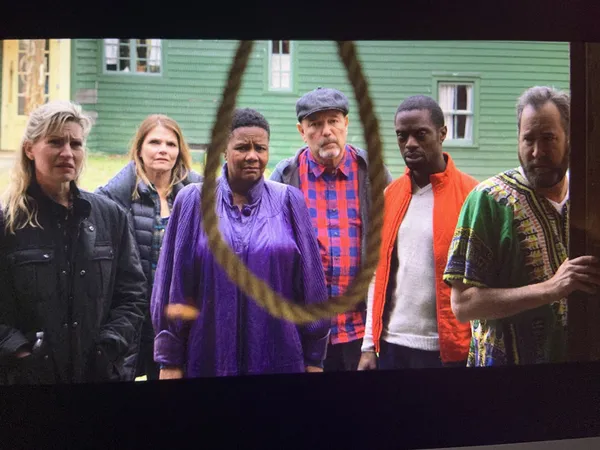Eye For Film >> Movies >> Red Pill (2021) Film Review
Red Pill
Reviewed by: Jennie Kermode

A lot of people frame Donald Trump’s rise to power in terms of a division between traditionalist and progressive Americans, the latter including minorities and those inclined to defend their rights. What it did, however, was to point up another division within the latter community. To some people – predominantly those who were white and reasonably well off – the existence of all the hatred and resentment which emerged into full public view was astonishing. To others, what was astonishing was that they hadn’t known it was there all along.
Horror is a genre which frequently deals with gaslighting, with a character who is well aware that something serious is wrong but is dismissed and treated as crazy by those around them. Often this character is a woman or child, reflecting social biases about credibility. In Red Pill, director Tonya Pinkins emphasises that such biases also exist in relation to race. Here, Cassandra (played by Pinkins herself) is the first to realise that she and her companions may be in danger, but her concerns are dismissed first by a man – her boyfriend Bobby (Adesola A Osakalumi) – and then by their white friends. Of course, they will eventually realise that she was right – but by then it might be too late.
Cassandra’s concern doesn’t come out of nowhere. The group have travelled to a small Southern US town is the hopes of rallying support for the Democrats ahead of the 2020 election. As they enter it, they see a large sign with not very subtle wording making it clear that some of them are not welcome. As they drive along the streets to their rented house, they see strangely dressed locals standing still in their front gardens, wearing masks. Folk horror fans may also get nervous at this point. Cassandra’s friends dismiss it as probably just some local festival. Before long, however, it will be impossible to keep up the denial. We’re presented with a situation which is rare in the genre, where even the smartest viewers will struggle to think of a way that the characters can escape.
It’s a strong premise – a little overblown in places, but Pinkins is attempting to find comedy in the degree of obliviousness which people are capable of when something is both inconvenient and alien to their mindset. Unfortunately the balance of horror and comedy is something which she struggles with elsewhere, and it doesn’t help that most of the characters are very thinly drawn. The film is also let down by poor quality effects work and the underdevelopment of its primary location. When it moves into thriller territory, we don’t have a clear enough sense of the layout of the house to viscerally understand how limited the characters’ options are. There are too many open questions and too many distractions.
A distinctive red and green colour scheme lends the film some character, recalling the Seventies B-movies in which US cinema first began to address issues of this sort. Clad in purple, Pinkins is appropriately out of place. Cassandra’s expectation of trouble doesn’t make it any less disorientating when things start to go wrong, and though the clash between suburban home and operatically staged violence may make for an odd viewing experience, it serves as another reminder of what’s taking place in real life, with grand cultural dramas disrupting and endangering the lives of ordinary people in mundane spaces.
Although a sub-plot about surrogacy doesn’t altogether work, raising complex and important issues which it singularly fails to explore, the film’s focus on women and, specifically, female antagonists enables it to address aspects of the US malaise which are frequently overlooked in cinema. Its exploration of friendship across racial lines adds to this, as it asks how much pressure is needed before white women’s solidarity cracks.
This is a film with important points to make and some interesting ideas, but Pinkins’ limited experience and low budget mean it has clearly fallen short of what she’s aiming for. One hopes that it will at least succeed in broadening conversations, and pave the way for stronger work in future.
Reviewed on: 28 Nov 2021

















